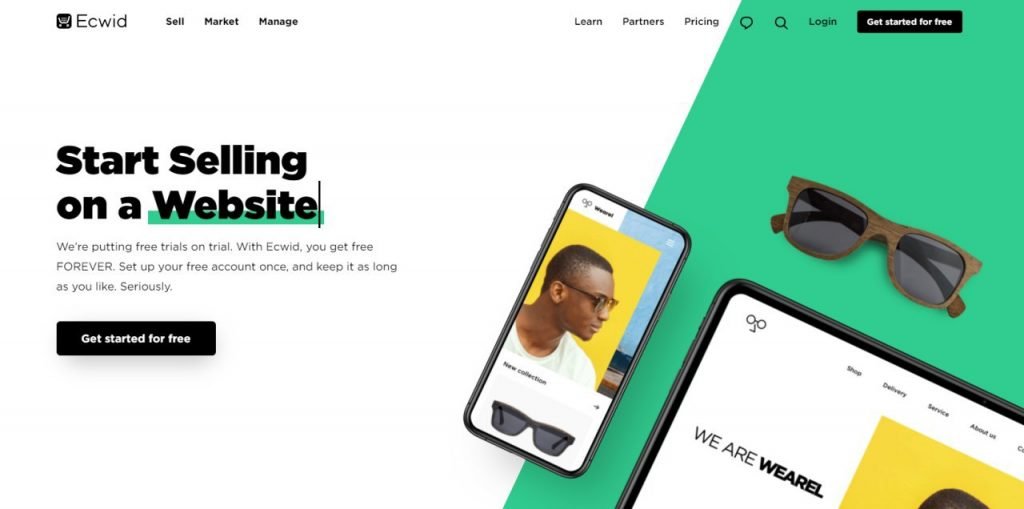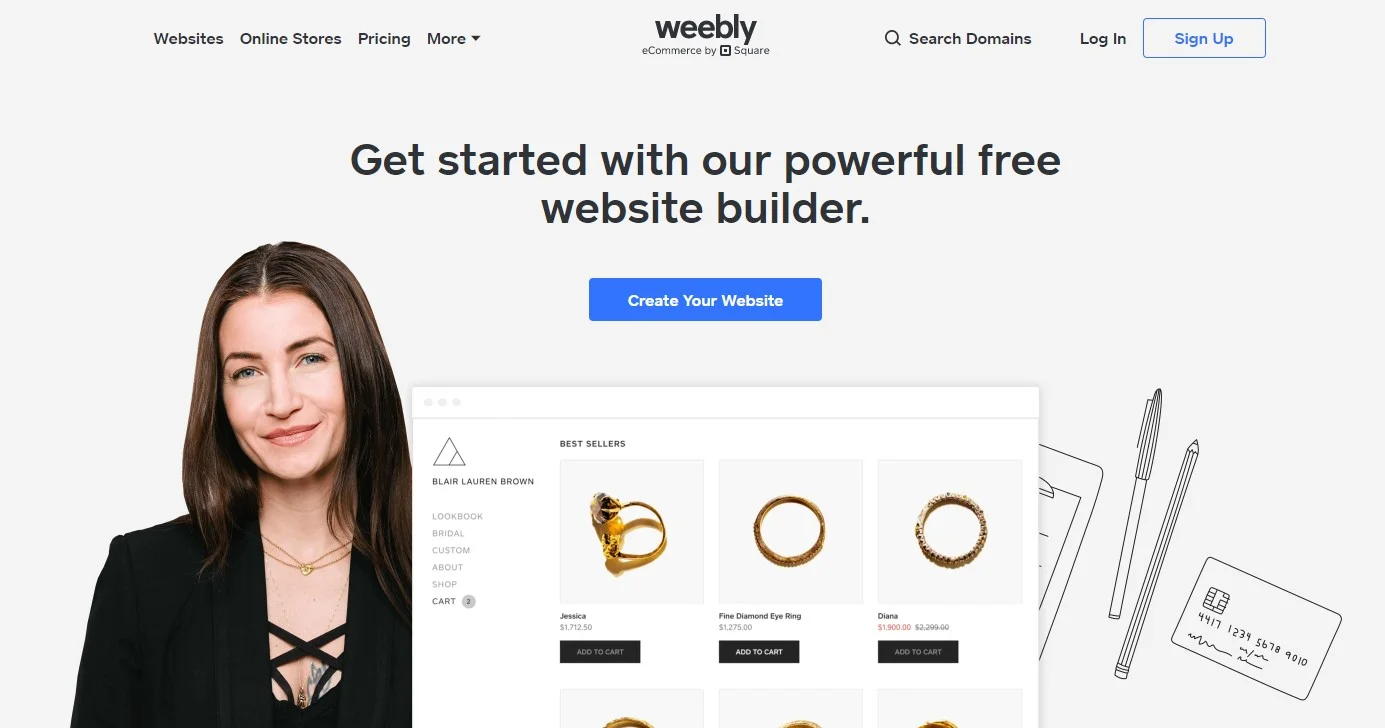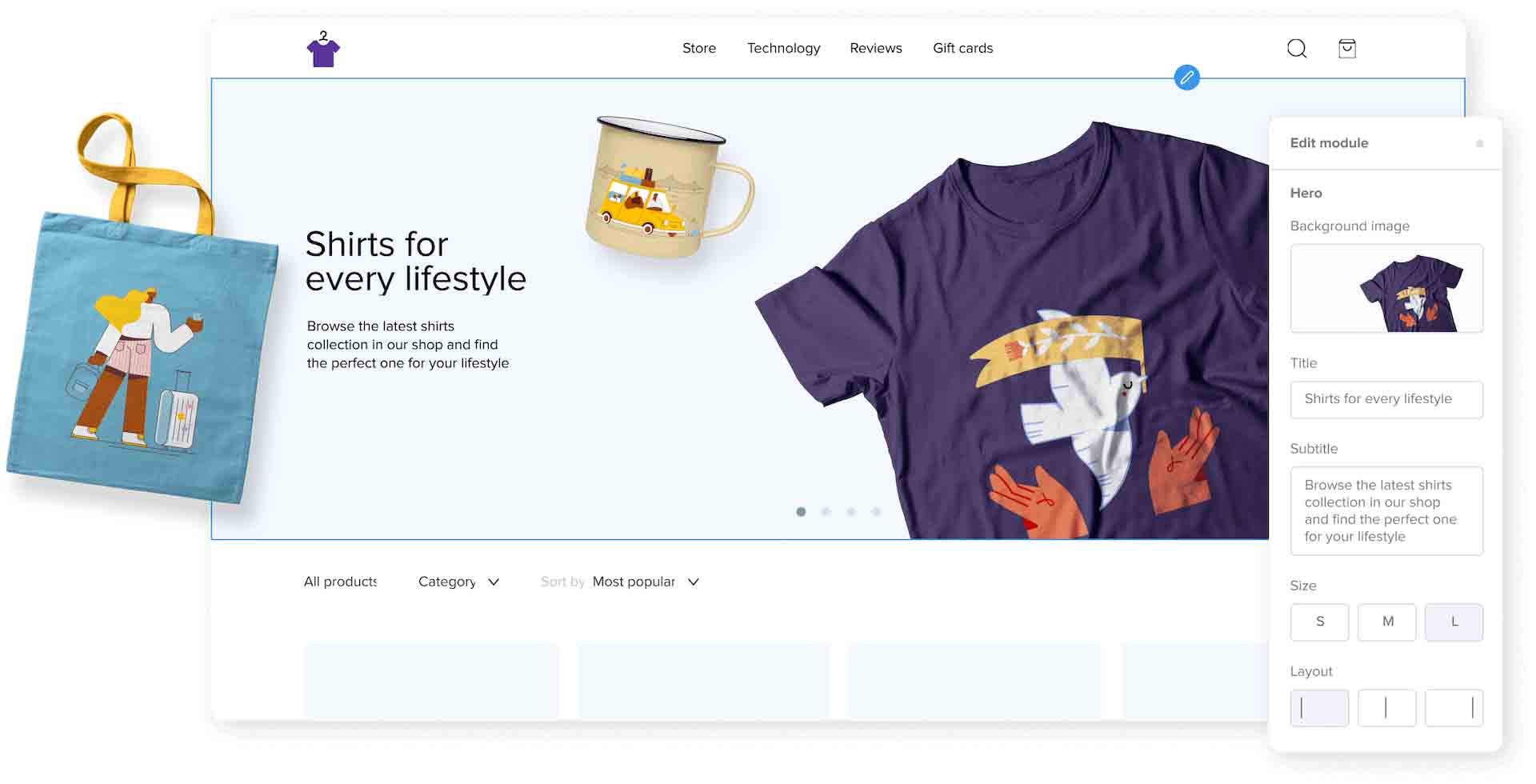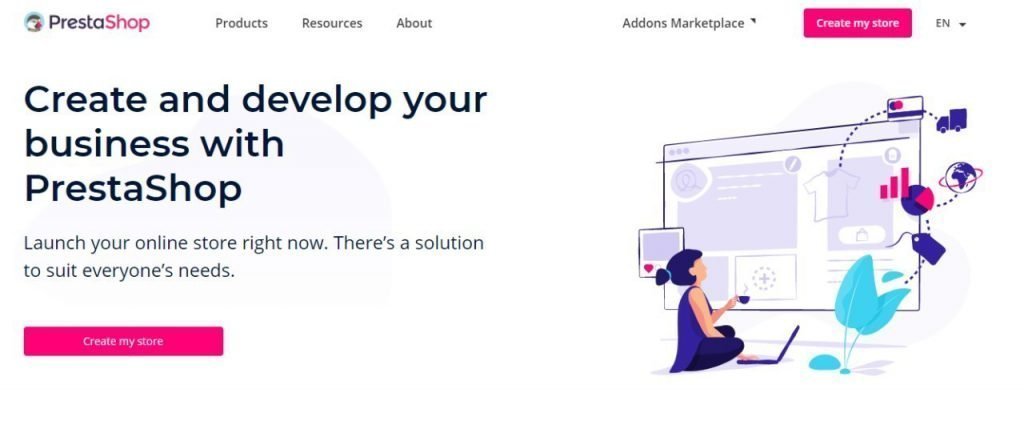Shopify is one of the best eCommerce website builders that enables anyone to build an online store without coding knowledge. It is a subscription-based platform that handles everything for you, from hosting the website to security, so you can focus on running your business.
However, just because Shopify is a powerful platform packed with many features, it doesn’t have to be the perfect platform for everyone to start an eCommerce business.
If you think Shopify is not the right platform for you, this article is for you. Here, we have collated a list of the best Shopify alternatives and competitors in the eCommerce space that you can consider to set up your online store.
Ready? Let’s get started.
1. BigCommerce

BigCommerce is a popular Shopify alternative for large eCommerce businesses. If you have an extensive product catalog and want to scale your store to handle the growing sales and traffic smoothly, you may want to move your online store to BigCommerce.
BigCommerce has a drag-and-drop page builder that enables you to create any kind of page easily without coding. Moreover, it comes with several paid and free themes, which you can quickly customize to set up the store within minutes.
Like Shopify, BigCommerce also has an app store, where you can find hundreds of third-party apps to connect with your online store for additional features, from marketing, and accounting to shipping services.
Finally, BigCommerce is an ideal choice for large enterprises because it doesn’t have transaction fees, which saves you 0.5% to 2% fees that Shopify charges. You can read our detailed BigCommerce review to learn more about its features and functionalities.
Pros –
- No transaction fees
- Drag-and-drop builder
- Customizable themes
- SEO-friendly
- Supports 55+ payment gateways
- Deep analytics reporting
Cons –
- Sales cap limit
- Limited Free themes
- Expensive premium themes
2. WooCommerce

WooCommerce is an open-source WordPress eCommerce plugin that enables you to add a robust storefront on WordPress sites. It is the best free Shopify alternative, enabling you to build responsive and mobile-friendly sites at no cost.
You can sell anything on WooCommerce like physical products, print-on-demand, services, software, and licensed products. The platform is highly SEO-friendly as you can add SEO plugins like Yoast SEO that quickly optimize your site to unlock high discoverability.
Like the Shopify App Store, you can access thousands of plugins from the WordPress directory to add advanced functionalities or connect your store with third-party software. You can also find themes per your needs and customize them quickly using page builder plugins or custom coding.
Even though WooCommerce is free, you must invest in a reliable hosting provider and a few plugins to boost your store’s performance. But unlike Shopify, you won’t have to pay monthly subscription fees.
Pros –
- Free forever
- No transaction fees
- Easy to set up
- 100% customization flexibility
- Thousands of customizable themes (Free & paid)
- Access free and paid plugins
- Sell unlimited products
Cons –
- Need technical skills
- Knowledge of WordPress is a must.
3. Squarespace

Squarespace is another excellent eCommerce website builder with a prime focus on creative website design. It comes with a wide range of beautiful eCommerce templates that let you display your products in a visually appealing way that boosts sales and conversions for the store.
It is the perfect Shopify alternative for artists to sell their artwork, including digital art, photographs, videos, graphics, and more. And the best part is that you don’t have to install any additional apps/plugins to make it possible.
Like Wix, Squarespace has several built-in sales and marketing tools, including email marketing, blogging, and affiliate management. However, you must know that Squarespace currently supports only two payment gateways- PayPal and Stripe.
Read our comprehensive Squarespace review to learn more about its features and how it can be helpful for your business.
Pros –
- Beginner-friendly
- Stunning, easy-to-customize templates
- Built-in marketing tools
- No transaction fees
- Manage your store via mobile app
Cons –
- Only two payment gateway supported
- Limited customization flexibility
- Limited extensions
4. Ecwid

Ecwid is the most affordable Shopify alternative for small businesses with a limited product catalog to sell. Unlike Shopify, it doesn’t offer much flexibility with website design customization but is packed with every essential feature you need to set up an online store to sell anything.
With Ecwid, you can sell on multiple channels, including your other websites, social media, and marketplaces like Amazon, eBay, and Etsy. It also allows you to sell in person using Clover, Stripe, PayPal, or another POS system, with a centralized dashboard to manage your orders and inventory.
You should check out our Ecwid review to know more about its features and functionalities that you can leverage to set up your online store.
Pros –
- Free forever plan
- Beginner-friendly with a simple user interface
- Sell on multiple online channels
- Built-in advertising tool for Google Ads, Facebook & others
- The app market for direct integration with various platforms & software
Cons –
- Not ideal for large product catalogue store
- Limited customization
- Lack of detailed analytics reporting
- Customer support is not available in the free plan
5. Wix

Wix is a popular Shopify alternative that lets you build user-friendly online stores on the fly without much ado. You can get started with your online store using Wix ADI or opt for the Wix editor, which offers great customization options.
With Wix, you can sell various physical & digital products, dropshipping products, print-on-demand, and much more. Huge credits to the store builder that offers numerous options to upload products, thus contributing to higher sales figures.
It has built-in marketing features and eCommerce tools that you need to set up a store and manage it smoothly. The best part is that, unlike Shopify, with Wix, you don’t have to rely on third-party software for services like email marketing, appointment booking, Facebook Ads, landing pages, and more.
Wix also has an integrated CRM, so managing all your customer profiles at a centralized interface becomes effortless. Also, it has excellent SEO capabilities to optimize your online storefront for high search rankings.
Overall, Wix eCommerce is an intuitive website builder that enables you to create a beautiful storefront to sell anything from digital products, and subscriptions to physical products. You can check our in-depth Wix eCommerce review to learn more about its eCommerce features and capabilities
Pros –
- Customizable store templates
- Easy to use drag-and-drop page editor
- Built-in marketing tools
- Powerful SEO tools
- No transaction fees
- Multiple Payment Methods
- Powerful analytics reporting
- 24/7 customer support
Cons –
- Ideal only for setting up small online stores.
- The backend becomes too slow if you start uploading huge products.
- Multi-channel selling options are limited
- Website template can’t be changed
6. Weebly

Weebly is the best Shopify alternative for small businesses looking for a simple platform to build and manage their online store. It provides everything you need to build and grow your eCommerce business at an affordable price.
Unlike Shopify, Weebly is not packed with powerful features, but it is great for someone with a limited budget to start an eCommerce business. It has built-in marketing tools for email marketing, SEO, customer reviews, coupons, and more.
Weebly has several online store templates, which you can easily customize using its simple drag-and-drop builder. And most importantly, if you are a beginner, Weebly customer support will always guide you from launching your store to growing it.
Pros –
- Free domain for the website
- Easy-to-use & beginner-friendly
- Customizable responsive themes
- SEO-friendly
- App center with 100+ software integrations
- Built-in email marketing feature
- 24/7 support via email, chat, and phone
Cons –
- Challenging to migrate the store to other platforms
- Not suitable for large product catalog stores
7. Sellfy

If you are looking for a Shopify alternative that makes it super easy to sell digital products, Sellfy might be the perfect platform for you.
It is one of the best platforms to sell digital products like ebooks, online courses, graphics, audio, videos, and more. It also allows you to sell print-on-demand products such as T-shirts, hoodies, mugs, etc.
Sellfy provides a beautiful storefront where you can sell all your products hassle-free. It has limited customization options, which lets you add a logo and change colors to match your brand.
It also has built-in marketing features, enabling you to promote your store and generate more sales without investing in additional tools. It has a pretty good email marketing tool, which lets you send product updates to existing customers and collect newsletter subscribers to your store.
You should also check our in-depth Sellfy Review to learn more about its features, pricing, and more.
Pros –
- Free plan available
- Easy to set up
- No transaction fees
- 30-days moneyback guarantee
- Built-in marketing tools
- Built-in print on demand
- Accept payment worldwide
Cons –
- Sales cap on each plan
- Only PayPal and Stripe supported
8. Square Online

If you are looking for a fantastic Shopify alternative that offers more selling options, Square will be the best choice. It’s a one-stop destination for merchants as you can sell on a website, use POS for in-store, expand visibility by promoting on social media, and book appointments.
The most significant advantage of this platform is that it offers a free plan accompanied by a transaction fee with every payment. This plan will offer shopping cart functionality, unlimited product support, and much more.
Square is one platform with a free plan that makes your life easier if you’re getting started. Besides, you can access the entire set of services for your business, whether you’re a beginner or already an established one.
Pros –
- Free custom domain for a year
- Easy to set up
- In-depth analytics reporting
Cons –
- Extensions and integrations are limited
- Marketing features can be improved
9. PrestaShop

PrestaShop is a renowned eCommerce platform that has empowered over 3,00,000 merchants in achieving their goals and objectives. It’s one of the best Shopify alternatives as it is open-source and completely free of cost to have complete ownership of your content.
The most predominant fact about PrestaShop is that it has over 600 features that help you manage your product items, orders, and customers, eventually boosting your store’s profit to the next level. Besides, it offers 5,000+ customizable themes to build an ideal-looking storefront.
To use PrestaShop, you need to buy a hosting package and a domain name. If you have some difficulty in coding, you can hire a developer who helps you build a sparkling online store without any huge investment.
Pros –
- It doesn’t incur any additional transaction fees.
- It offers over 50 payment solutions to manage any type of transaction.
- You can sell overseas as the platform is multilingual and supports multiple currencies.
Cons –
- It doesn’t provide integration with existing CMS systems like WooCommerce.
- It can be a bit complex for beginners as it requires technical skills.
- The number of free templates is very limited, and the premium ones are expensive.
10. Opencart

Opencart is a free Shopify alternative as it is an open-source eCommerce platform that can be completely customizable. One of the significant aspects is that even if you have multiple stores, you can manage it easily from one admin interface, which is a breeze.
One of the main reasons for the platform’s popularity is that you can access 13,000+ modules and themes from its marketplace. It offers a beautiful set of responsive themes, service integrations, payment providers, shipping methods, etc., and language packs.
With Opencart, you can boost your sales and conversion rates as it offers built-in SEO, discounts, and coupons that catch your customers’ attention. Using these tools, you can motivate your customers to shop more, which escalates your average order value.
Pros –
- It is relatively easy to use and set up than other open-source eCommerce platforms.
- It offers a considerable level of integration.
- It has an in-built affiliate system where you can promote products and services and get paid.
Cons –
- The flexibility levels are not as easy as Shopify.
- The number of built-in features can be improved.
- The learning curve can be deep for beginners.
Which is the Best Shopify Alternative for you?
Shopify is the most popular eCommerce platform in the world. In fact, for anyone who wants to start an eCommerce business, the first platform they come to know about is Shopify.
But it’s not for everyone.
Remember that the perfect eCommerce platform for your business can be the one that matches your business needs, budget, and skills to manage the store.
Finally, let’s wrap up with our top 5 Shopify alternatives –
- BigCommerce – Best Shopify alternative for enterprises
- WooCommerce – Best free Shopify Alternative
- Squarespace – Best Shopify alternative to sell artwork
- Ecwid – Cheapest Shopify Alternative
- Wix – Best Alternative for beginners
I hope this article helped you find a suitable Shopify alternative to start your eCommerce business. If you already have a store on Shopify and want to migrate it to another platform, you should check our list of the best shopping cart migration tools.



